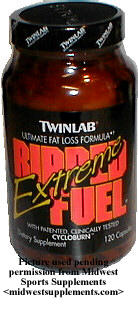
 Ephedrine
is found in a number of products, including Ripped Fuel, Metabolife 350,
Ultimate Orange, Purple Blast, Herbalife's Thermajetics, and Ripped Force
(Haller and Benowitz 2000). Due to ephedrine's sympathomimetic capabilities,
it is able to cause a variety of stimulatory effects in the body (Caveney
et al., 2001). In spite of its presence in some of the most popular
dietary supplements, ephedrine has not been conclusively proven to reduce
fat by any direct phytochemical process (Haller and Benowitz, 2001). Ephedrine,
when coupled with caffeine, does have the ability to indirectly promote
fat reduction by increasing energy expenditure through its stimulatory
effects. Obese rhesus monkeys, given ephedrine and caffeine for a period
of eight weeks, experienced significant reduction in body fat mass.
Ephedrine
is found in a number of products, including Ripped Fuel, Metabolife 350,
Ultimate Orange, Purple Blast, Herbalife's Thermajetics, and Ripped Force
(Haller and Benowitz 2000). Due to ephedrine's sympathomimetic capabilities,
it is able to cause a variety of stimulatory effects in the body (Caveney
et al., 2001). In spite of its presence in some of the most popular
dietary supplements, ephedrine has not been conclusively proven to reduce
fat by any direct phytochemical process (Haller and Benowitz, 2001). Ephedrine,
when coupled with caffeine, does have the ability to indirectly promote
fat reduction by increasing energy expenditure through its stimulatory
effects. Obese rhesus monkeys, given ephedrine and caffeine for a period
of eight weeks, experienced significant reduction in body fat mass.
A large number of adverse effects have also been associated with ephedrine use. Although the majority of reports have involved cardiovascular incidents, there were a number of CNS-related effects reported. A recent FDA-funded study of 140 individual adverse effect cases showed that 47 percent of ephedrine-related adverse events were cardiovascular in nature, with hypertension occuring most frequently. Less serious events involved tremors, anxiety, nervousness, hyperactivity, and insomnia (Lee et al., 2000). The following is a list of various serious adverse events encountered in the study (cardiovascular incidents shown in red and CNS-related shown in blue):
- hypertension
- palpitations
- arrhythmia
- myocardial infarction
- cardiac arrest
- stroke
- transient ischemic attack
- seizure
The 140 case studies revealed that out of 43 incidents definitely attributed to ephedrine ingestion, 3 resulted in death, 7 resulted in permanent impairment, 4 resulted in the need for ongoing medical treatment, and 29 resulted in full recovery (Haller and Benowitz, 2001).
Out of 800 adverse events reports submitted to the FDA, 4 percent of cases mentioned hepatitis (Lee et al., 2000).
Current speculation suggests that these effects are brought about by susceptibility issues in ephedrine users. In other words, the combined sympathomimetic effects of ephedrine and caffeine are more harmful to someone with an underlying cardiovascular disease (Haller and Benowitz, 2001).
Regarding the number of CNS-related incidents, Lee et al. speculate that the ephedrine extraction process or the presence of other undiscovered toxins could contribute to such events (2000).
© Copyright 2001 Department of Biology, Davidson College, Davidson, NC 28036. Send comments, questions, and suggestions to: jokogoy@davidson.edu





